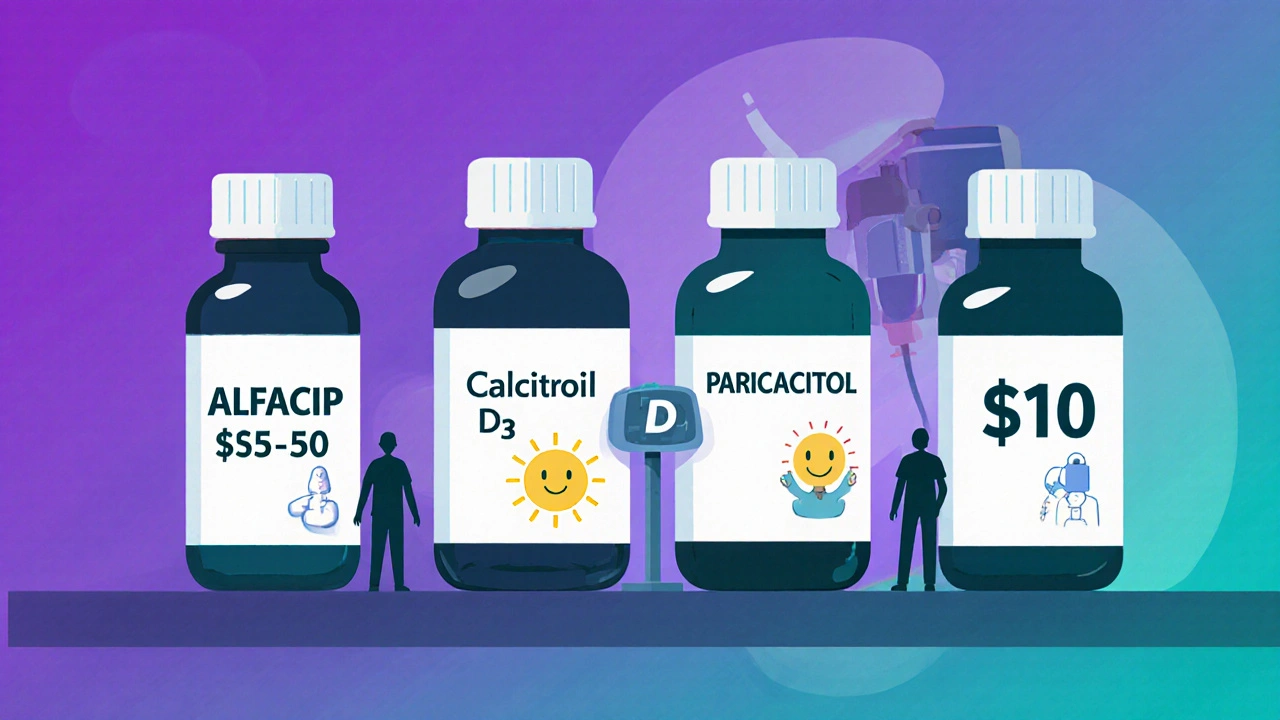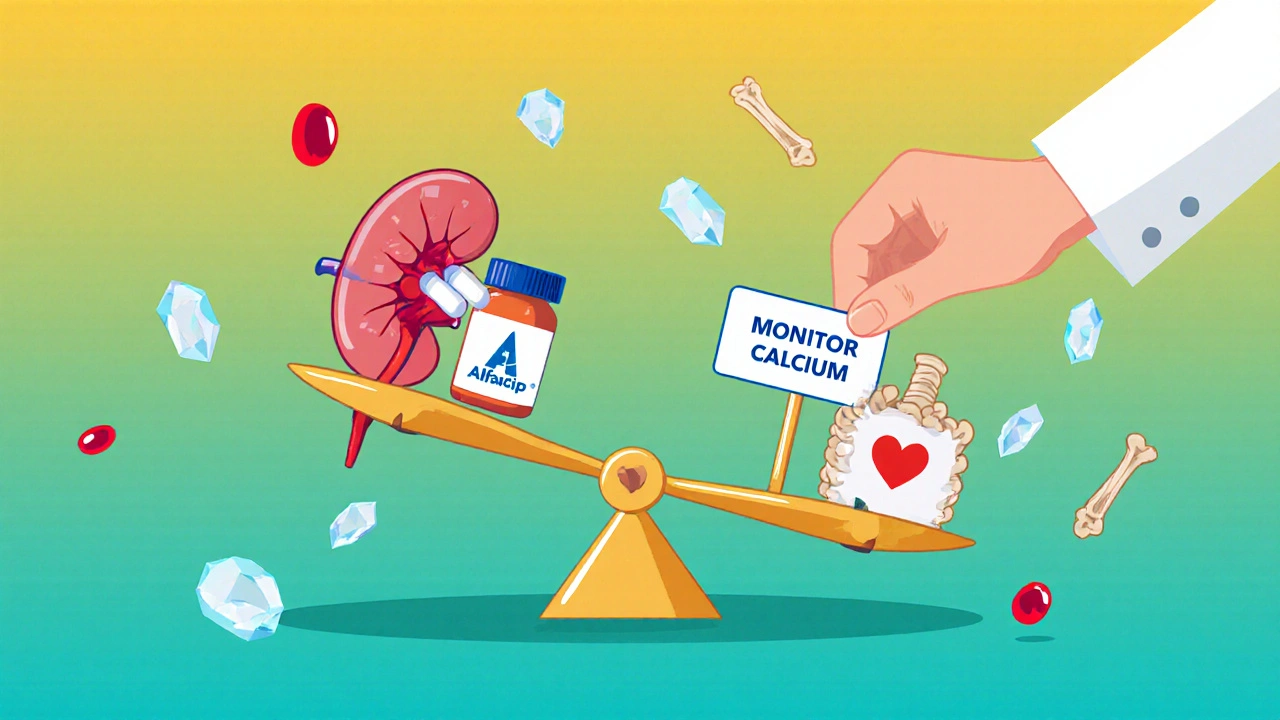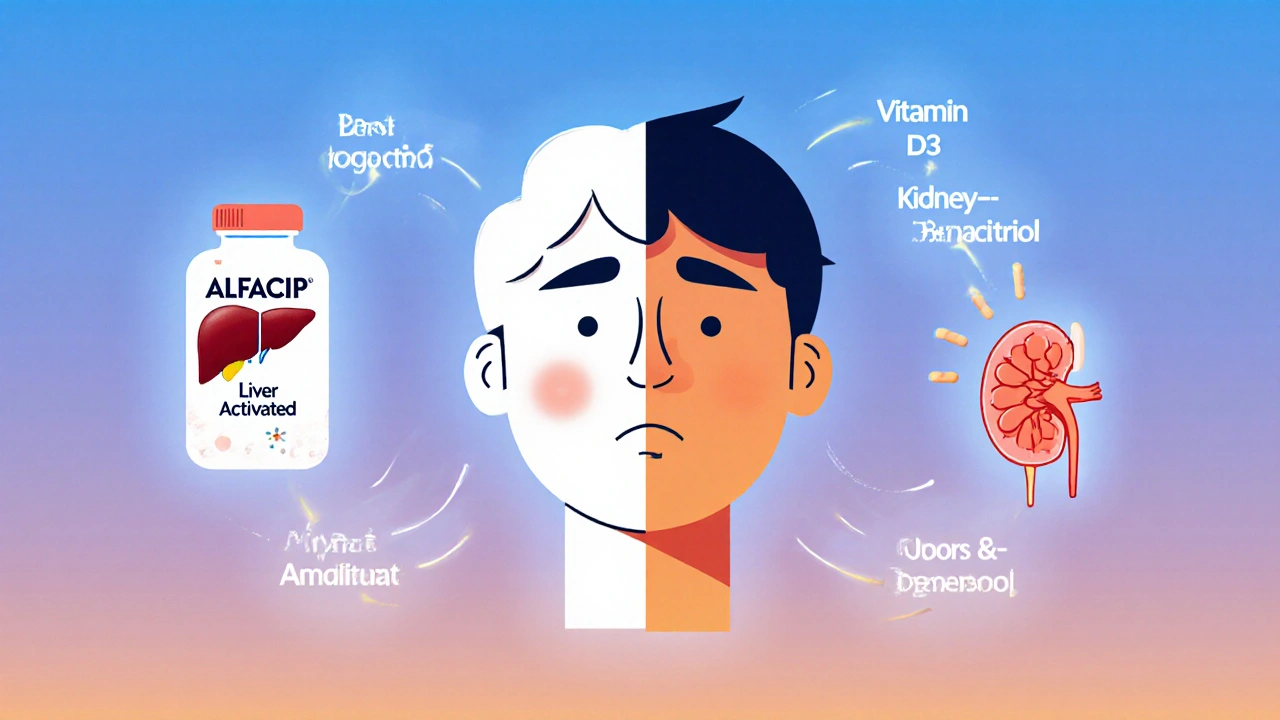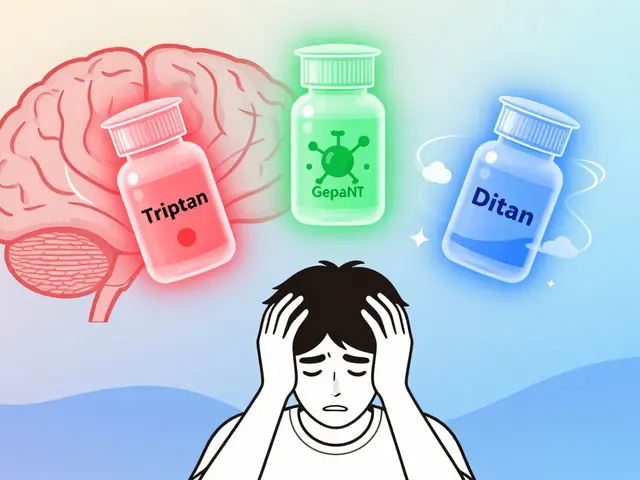If you’ve been prescribed Alfacip (Alfacalcidol) for low vitamin D or kidney-related calcium issues, you’re not alone. But you might be wondering: is this the best option? Are there cheaper, safer, or more effective alternatives? The truth is, Alfacalcidol isn’t the only player in this game-and choosing the right one can make a big difference in how you feel, how much you pay, and how well your body responds.
What Alfacip (Alfacalcidol) Actually Does
Alfacip is the brand name for alfacalcidol, a synthetic form of vitamin D that your body converts into calcitriol-the active hormone your kidneys normally make. It’s not regular vitamin D3 you get from supplements or sunlight. It’s already one step closer to being usable by your body, which makes it ideal for people whose kidneys can’t convert vitamin D on their own.
This is common in people with chronic kidney disease, hypoparathyroidism, or severe vitamin D deficiency that doesn’t respond to standard supplements. Alfacalcidol helps your intestines absorb calcium and keeps your bones from weakening. It also reduces parathyroid hormone levels, which can get out of control when calcium drops too low.
Typical doses range from 0.25 to 1 microgram per day, taken orally. Blood calcium and phosphate levels are monitored closely because too much can cause hypercalcemia-high calcium in the blood-which leads to nausea, confusion, kidney stones, or even heart rhythm problems.
Why People Look for Alternatives
Alfacip isn’t cheap. In Australia, a 30-day supply can cost between $30 and $50 out-of-pocket without a subsidy. Some patients report side effects like upset stomach or mild headaches. Others find their calcium levels still fluctuate despite taking it. And in some cases, doctors simply want to try something else-especially if the patient has liver problems or isn’t responding well.
That’s where alternatives come in. But not all are equal. Some work faster. Some are cheaper. Some require more monitoring. Here’s what’s actually out there-and how they stack up.
Alternative 1: Calcitriol (Rocaltrol, Calcijex)
Calcitriol is the fully active form of vitamin D-the same hormone your kidneys produce naturally. Unlike alfacalcidol, it doesn’t need liver conversion. That means it works faster and is often used in patients with severe kidney failure or those who need immediate results.
Compared to Alfacip, calcitriol has a shorter half-life (about 5-8 hours vs. 12-24 hours for alfacalcidol). This means you might need to take it twice a day, but you also have more control over blood levels. It’s available as capsules or injections.
Studies show calcitriol is just as effective as alfacalcidol in raising calcium levels, but it carries a slightly higher risk of hypercalcemia. In a 2023 trial published in the Journal of Renal Nutrition, 18% of patients on calcitriol developed elevated calcium levels compared to 12% on alfacalcidol.
It’s also more expensive than Alfacip in Australia and often requires prior authorization from Medicare for subsidy. If you’re on dialysis or have advanced kidney disease, your nephrologist may prefer calcitriol. For others, the extra cost and risk may not be worth it.
Alternative 2: Cholecalciferol (Vitamin D3)
Cholecalciferol is the natural form of vitamin D made by your skin in sunlight or found in fish oil, egg yolks, and supplements. It’s the cheapest option-often under $10 for a 90-day supply at any pharmacy.
But here’s the catch: cholecalciferol must be converted twice-first in the liver, then in the kidneys-to become active. If your kidneys are damaged, this process breaks down. That’s why doctors don’t usually recommend it for people with kidney disease.
For healthy adults with mild vitamin D deficiency (levels below 30 nmol/L), cholecalciferol is the first-line treatment. Doses range from 1,000 to 5,000 IU daily. Many people see improvement in 6-8 weeks. Bone pain, muscle weakness, and fatigue often improve within months.
But if you’ve been told you need Alfacip, switching to plain vitamin D3 without medical supervision could make things worse. It’s not a substitute-it’s a different tool for a different problem.

Alternative 3: Ergocalciferol (Vitamin D2)
Ergocalciferol is plant-based vitamin D, often derived from yeast or fungi. It’s less common now, but still used in some countries for deficiency correction.
Studies show it’s about 30% less effective than cholecalciferol at raising and maintaining vitamin D levels over time. It also has a shorter duration of action. In Australia, it’s rarely prescribed unless someone is vegan and refuses D3.
There’s no real advantage to using ergocalciferol over cholecalciferol. And it’s not a replacement for alfacalcidol in kidney patients. It’s basically a fallback option with weaker evidence.
Alternative 4: Paricalcitol and Doxercalciferol (Newer Options)
Paricalcitol and Doxercalciferol are newer vitamin D analogs designed specifically for people on dialysis. They’re more selective-they boost calcium absorption without overstimulating the parathyroid gland as much as calcitriol or alfacalcidol.
These are injectable or oral drugs approved for secondary hyperparathyroidism in chronic kidney disease. They’re not used for general vitamin D deficiency. In fact, they’re rarely prescribed outside hospital or dialysis settings.
Paricalcitol is more expensive than Alfacip and usually reserved for patients who can’t tolerate calcitriol or have persistent high PTH levels. Doxercalciferol has similar benefits but is less studied in long-term use.
If you’re not on dialysis, these aren’t relevant. They’re not alternatives-they’re specialized tools for complex cases.
Comparison Table: Alfacip vs. Alternatives
| Medication | Form | Active Form? | Best For | Cost (AUD, 30-day) | Hypercalcemia Risk | Monitoring Needed |
|---|---|---|---|---|---|---|
| Alfacip (Alfacalcidol) | Oral capsule | Yes (needs liver conversion) | Kidney disease, hypoparathyroidism | $30-$50 | Moderate | Monthly calcium, phosphate, PTH |
| Calcitriol | Oral capsule, IV | Yes (fully active) | Severe kidney failure, urgent correction | $50-$80 | High | Weekly to monthly |
| Cholecalciferol (D3) | Oral capsule, drops | No (needs liver + kidney conversion) | Mild deficiency in healthy people | $5-$15 | Low | Every 3-6 months |
| Ergocalciferol (D2) | Oral capsule | No | Vegan patients (rare) | $10-$20 | Low | Every 3-6 months |
| Paricalcitol | Oral, IV | Yes (selective) | Dialysis patients with high PTH | $100-$150 | Low | Weekly to monthly |
When to Stick With Alfacip
Alfacip remains the go-to for many patients because it strikes a balance. It’s effective, widely available, and less likely to spike calcium than calcitriol. If your kidney function is moderately impaired-not end-stage-and you’re responding well with stable blood levels, there’s no reason to switch.
Many patients in Western Australia report fewer side effects and better compliance with Alfacip than with calcitriol. It’s also covered under the PBS (Pharmaceutical Benefits Scheme) for specific conditions like hypoparathyroidism and chronic kidney disease, which makes it affordable for most.

When to Consider Switching
You might want to talk to your doctor about alternatives if:
- Your calcium levels keep rising despite taking Alfacip
- You’re paying out-of-pocket and can’t afford it
- You have liver disease and can’t convert alfacalcidol properly
- You’re on dialysis and need more targeted control of PTH
- You’ve been on it for over a year with no improvement in bone pain or muscle strength
Never switch on your own. Stopping or changing vitamin D analogs without supervision can cause dangerous drops in calcium, leading to muscle cramps, seizures, or heart issues.
What About Calcium Supplements?
Many people on Alfacip also take calcium supplements-like calcium carbonate or calcium citrate. That’s normal. But calcium alone won’t fix low vitamin D activity. You need the hormone to make calcium absorb.
Calcium supplements can help if your diet is low, but they’re not a substitute. If you’re taking both, your doctor should monitor your total calcium intake. Too much calcium + too much alfacalcidol = kidney stones or calcification in blood vessels.
Bottom Line: No One-Size-Fits-All
Alfacip isn’t the best for everyone-but it’s the right choice for many. If you’re doing well on it, stick with it. If you’re struggling with cost, side effects, or results, ask your doctor about calcitriol or whether you even need a prescription-grade vitamin D analog at all.
For healthy people with mild deficiency, cholecalciferol is cheaper, safer, and just as effective. For kidney patients, Alfacip and calcitriol are the main options-and the choice often comes down to how your body responds, not just the price tag.
The key is working with your doctor to find the version that keeps your calcium stable, your bones strong, and your budget intact.
Is Alfacip the same as vitamin D3?
No. Alfacip (alfacalcidol) is a synthetic hormone that your liver converts into calcitriol, the active form of vitamin D. Vitamin D3 (cholecalciferol) is the natural form your body makes from sunlight. D3 needs both liver and kidney conversion to become active, while Alfacip skips the kidney step-making it useful for people with kidney disease.
Can I take vitamin D3 instead of Alfacip?
Only if your kidneys are working normally. If you have chronic kidney disease, hypoparathyroidism, or severe deficiency, vitamin D3 won’t convert properly and won’t help. Taking it instead of Alfacip could make your symptoms worse. Always check with your doctor before switching.
Which is cheaper: Alfacip or calcitriol?
Alfacip is generally cheaper. A 30-day supply costs $30-$50 in Australia, while calcitriol can run $50-$80. Both are subsidized under PBS for approved conditions, but calcitriol often requires extra paperwork from your doctor to get coverage.
Does Alfacip cause weight gain?
No, Alfacip doesn’t directly cause weight gain. But if it raises your calcium too high, you might feel sluggish, nauseous, or lose your appetite-which can lead to unintentional weight loss. Some people report feeling better overall once their vitamin D levels normalize, which might lead to increased appetite and slight weight gain-but that’s a sign of recovery, not a side effect.
How long does it take for Alfacip to work?
You’ll usually see changes in blood calcium and phosphate levels within 1-2 weeks. Symptoms like bone pain or muscle weakness may take 4-8 weeks to improve. Full bone density recovery can take months to a year, depending on how long you’ve been deficient.
Can I take Alfacip with other medications?
Some medications interfere with Alfacip. Thiazide diuretics can raise calcium too high. Steroids may reduce its effectiveness. Digitalis (used for heart conditions) becomes more dangerous if calcium levels rise. Always tell your doctor about every pill, supplement, or herb you take.
Next Steps
If you’re on Alfacip and wondering whether it’s right for you, schedule a blood test. Ask your doctor to check your serum calcium, phosphate, parathyroid hormone (PTH), and 25-hydroxyvitamin D levels. Bring a list of your symptoms and what you’re paying for your meds.
If cost is an issue, ask about generic alfacalcidol-it’s the same drug, just cheaper. If side effects are a problem, ask about calcitriol or whether you might respond better to a lower dose.
Most importantly, don’t stop or switch without guidance. Vitamin D analogs are powerful. Used right, they protect your bones and heart. Used wrong, they can cause serious harm.




Lorne Wellington on 31 October 2025, AT 13:51 PM
Man, this post is a godsend. I’ve been on alfacalcidol for 2 years after my kidney transplant and honestly? I didn’t even know there were alternatives. 🤯 Cholecalciferol sounded like a cheat code until I read the part about kidney conversion - yikes. Now I get why my doc won’t let me switch to D3. Also, $5 for D3 vs $50 for Alfacip? My wallet just did a backflip. Thanks for the table - printed it out and taped it to my fridge. 🙌